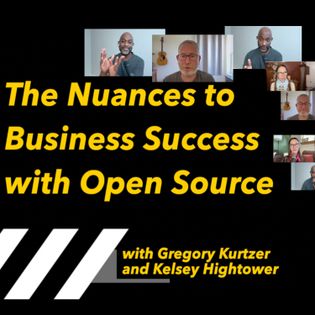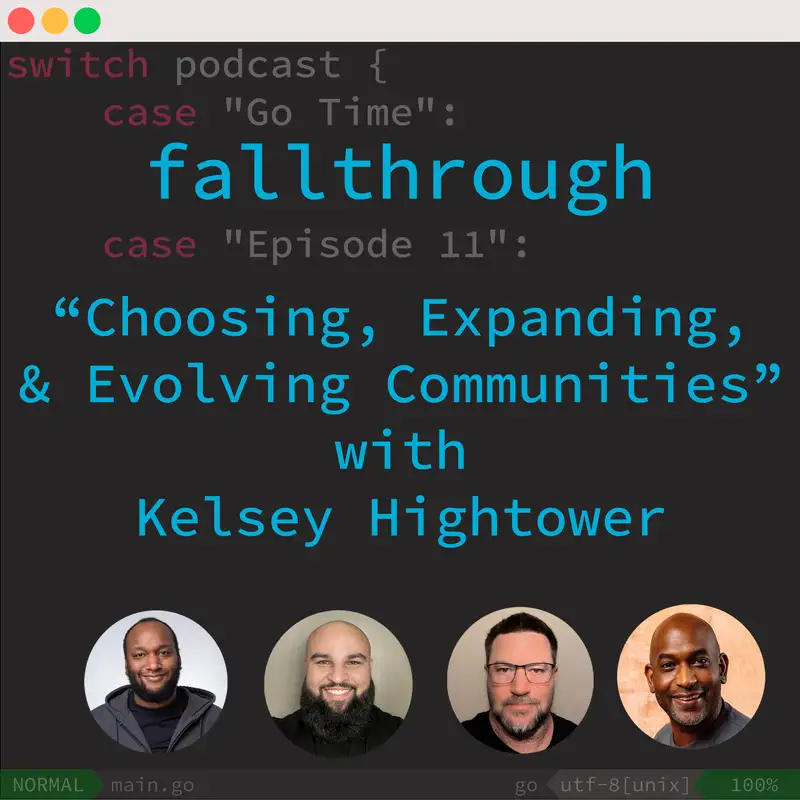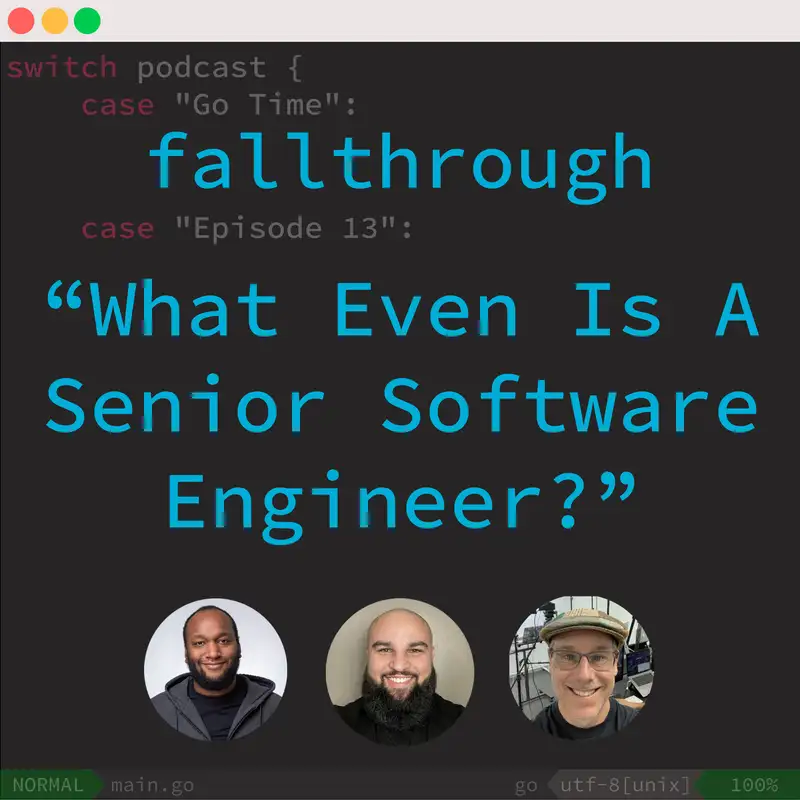Kind listens
Listened to
Cup o' Go | Heap Happens: True Crimes in Go 🧹🔪 Plus which YAML is the best for you?

Post details
Visit https://cupogo.dev/ for store links, past episodes including transcripts, and more!Correction: Yoke _is_ a Helm replacementYour code deserves better: give it a linter! - talk in the Czech Repulic soonAccepted: waitgroup.Go Leak and Seek: A Go Runtime Mysterygo-yaml goes...

Listened to
Open Source Security: CVE for EOL with Aaron Frost

Post details
Aaron Frost explores the overly complex world of vulnerability identifiers for end of life software. We discuss how incomplete CVE reporting creates blind spots for users while arming attackers with knowledge. The conversation uncovers the ethical tensions between resource constraints and security transparency, highlighting why the "vulnerable until proven otherwise" approach is the best path forward for end of life software. The show notes and blog post for this episode can be found at

Listened to
E169: Building New Standards for Observability - Lightstep & OpenTelemetry by Open Source Startup Podcast

Post details
Ben Sigelman is the Co-Founder & CEO of observability platform Lightstep as well as Co-Creator of open source observability frameworks OpenTracing and OpenTelemetry. Lightstep was acquired by ServiceNow in 2021 and OpenTelemetry was released in 2019 and has since become the standard observability framework. In this episode, we dig into:The founding story for Lightstep - including the initial pivot into the ideaThe benefits Lightstep got from open sourcing OpenTracing The OpenTracing and OpenCensus merger into OpenTelemetryWhy OpenTelemetry has been so widely adopted Ben's perspective on the many companies building with OpenTelemetry todayHow their team made the decision to take the ServiceNow acquisition Company building learnings around team building (& more!)

Listened to
Proud pod parents with Richard Moot from Square (Changelog & Friends #88)

Post details
Richard Moot joins us to discuss Changelog helping Square launch a developer pod and the excitement around MCP (Model Context Protocol) servers. What might it foretell about the future of human/robot relations?
Listened to
S2E6: Attila (with Christopher Walken and Sarah Bock)
by

Post details
<p>Legendary actor Christopher Walken, who plays Burt, is on the podcast this week to nerd out about acting with Ben and help break down Season 2 Episode 6. He reflects on the unique energy between him and John Turturro, playing two different sides of Burt, and why Bugs Bunny might be the greatest actor of all time. Then, Ben and Adam discuss the rest of the episode and the relationships growing both inside and outside of Lumon. But wait — there’s even more! The guys also talk with Sarah Bock, who plays Ms. Huang, about how scary Ms. Huang can be and what the first year of college has been like for Sarah.</p><p>To learn more about listener data and our privacy practices visit: <a href="https://www.audacyinc.com/privacy-policy">https://www.audacyinc.com/privacy-policy</a></p><p>Learn more about your ad choices. Visit <a href="https://podcastchoices.com/adchoices">https://podcastchoices.com/adchoices</a></p>

Listened to
Open Source Security: Open Source Maintenance with Gary Kramlich

Post details
In this episode, Gary Kramlich, the lead developer of Pidgin discusses the challenges and strategies of maintaining a 26-year-old open source messaging client.Gary tell us all about how a small team manages technical debt, handles library dependencies, and makes decisions about rewrites versus incremental improvements while supporting a broader open source ecosystem. The accompaning blog can be found at

Listened to
The era of durable execution with Stephan Ewen (Changelog Interviews #636)

Post details
Stephan Ewen, Founder and CEO of Restate.dev joins the show to talk about the coming era of resilient apps, the meaning of and what it takes to achieve idempotency, this world of stateful durable execution functions, and when it makes sense to reach for this tech.
Listened to
S2E5: Trojan's Horse (with Michael Chernus)
by

Post details
<p>This week, Ben and Adam welcome Michael Chernus — who plays Ricken Hale, the visionary author of “The You You Are” — to help unpack Season 2 Episode 5. And while you might expect Ricken to host a podcast of his own, Michael reveals that Ricken is actually post-podcast, so today’s episode is a really big deal. Together, they discuss Ricken’s writing, his relationship with Devon, and the actorly impulse to be liked. Then, Ben and Adam break down the rest of the episode and the challenges of crafting this soft-reset for the MDR team.</p><p>To learn more about listener data and our privacy practices visit: <a href="https://www.audacyinc.com/privacy-policy">https://www.audacyinc.com/privacy-policy</a></p><p>Learn more about your ad choices. Visit <a href="https://podcastchoices.com/adchoices">https://podcastchoices.com/adchoices</a></p>

Listened to
S2E4: Woe's Hollow (with Theodore Shapiro)
by

Post details
<p>For Season 2 Episode 4, Ben and Adam are joined by <em>Severance’s</em> Emmy-winning composer, Theodore Shapiro — or, Teddy Shaps, as his friends call him. He pulls back the curtain on his long-standing collaboration with Ben Stiller, going all the way back to 2004’s Dodgeball; the four chords that unlocked <em>Severance’s</em> ear-worm of a main theme; and the world of Kier folk tunes he discovered while scoring this episode. Then, Ben and Adam talk about filming this monumental episode where the Outties go out-f***ing-side.</p><p>To learn more about listener data and our privacy practices visit: <a href="https://www.audacyinc.com/privacy-policy">https://www.audacyinc.com/privacy-policy</a></p><p>Learn more about your ad choices. Visit <a href="https://podcastchoices.com/adchoices">https://podcastchoices.com/adchoices</a></p>

Listened to
Open Source Security: Why do we keep ignoring CI security with François Proulx

Post details
François Proulx, a supply chain security researcher at Boost Security, discusses how continuous integration (CI) and build pipeline security represents a critical and overlooked hole in our supply chain security. It seems like most supply chain compromises are actually from CI system breaches rather than direct code compromise, yet we seem to obsess over everything on either side of the CI system. François has a bunch of really good practical suggestions for how we can start to improve our CI security today. The blog post for this episode can be found at

Listened to
Sean Goggins on Sustainability through CHAOSS
by

Post details
Sean shares his work with the CHAOSS Project, exploring open-source sustainability, leadership, metrics, and his academic journey.

Listened to
Cup o' Go | Don't give me that line feed! 🖶

Post details
🛡️ Go 1.24.2 and Go 1.23.8 are releasedAccepted: structured output for test attributesInterview with Daniel Nephin in Episode 5Meetups🇬🇧 Birmingham, UK, April 17🇬🇧 Manchester Gophers new web site🇺🇸 Go Meetup w/ Shy @ San Francisco, May 28🫚 Go Blog: Traversal-resistant file APIs by Damien Neil🇬🇧...

Listened to
Turn him into a walrus (Changelog & Friends #87)

Post details
Jerod turns Adam into Lego, a Walrus, and a Walrus in the style of Studio Ghibli...and so much more. This is a good one to watch on YouTube.
Listened to
The Nuances to Business Success with Open Source | My Open Source Experience Podcast

Post details
with Gregory Kurtzer and Kelsey Hightower

Listened to
Dependency Track Community Meeting (2025-04-02)

Post details
Monzo present how they're using Dependency Track

Listened to
S2E3: Who Is Alive? (with Gwendoline Christie)
by

Post details
<p>To unpack Season 2 Episode 3, Ben and Adam are joined by Gwendoline Christie, who plays a mysterious new Lumon employee, for her first ever podcast. And she’s a natural! They talk all about her unique acting journey, the power of leaning into the absurd and obscene, and how protective her character is of her department -- the people and the goats. Plus, she reveals the three things she learned about goats while filming Severance: they are highly intelligent, they eat everything, and they are little freaks.</p><p>To learn more about listener data and our privacy practices visit: <a href="https://www.audacyinc.com/privacy-policy">https://www.audacyinc.com/privacy-policy</a></p><p>Learn more about your ad choices. Visit <a href="https://podcastchoices.com/adchoices">https://podcastchoices.com/adchoices</a></p>

Listened to
S2E2: Goodbye Mrs. Selvig (with Dan Erickson)
by

Post details
<p>Everyone’s favorite brain in a jar, Severance creator Dan Erickson, is back with Ben and Adam to talk about Season 2 Episode 2. Dan reflects on creating an all-Outtie episode, wearing uncomfortable shoes in solidarity with actors, and the shared door-factory-universe between Severance and Monsters Inc. They also answer the question everyone’s been asking: what do you eat for lunch at Lumon?</p><p>To learn more about listener data and our privacy practices visit: <a href="https://www.audacyinc.com/privacy-policy">https://www.audacyinc.com/privacy-policy</a></p><p>Learn more about your ad choices. Visit <a href="https://podcastchoices.com/adchoices">https://podcastchoices.com/adchoices</a></p>

Listened to
S2E1: Hello, Ms. Cobel (with Tramell Tillman)
by

Post details
<p>The wait is over. Ben and Adam break down the Season 2 Premiere with the incredible Tramell Tillman — aka Mr. Milchick, aka Mr. Milkshake. Tramell shares what it means for Milchick to become the new Floor Manager and argues that he really isn’t all that bad, once you get to know him. Plus, the pod unveils a few new perks: the guys answer fan questions from the Severed Floor Post Box and clairvoyant Zach Cherry predicts what will happen in next week’s episode.</p><p>Our hearts go out to all those impacted by the Los Angeles fires. Here are some links to organizations supporting the relief efforts:</p><p><a href="https://www.cafirefoundation.org/what-we-do/for-communities/disaster-relief">California Fire Foundation Wildfire & Disaster Relief Fund</a></p><p><a href="https://donate.wck.org/give/654000/?#!/donation/checkout">World Central Kitchen</a></p><p><a href="https://www.calfund.org/funds/wildfire-recovery-fund/">California Community Foundation - Wildfire Recovery Fund</a></p><p><a href="https://give.pasadenahumane.org/give/654134/#!/donation/checkout">Pasadena Humane - Eaton Fire Emergency</a></p><p><a href="https://www.letterscharity.org/altadena">Letters From Altadena: Wildfire Relief</a></p><p>To learn more about listener data and our privacy practices visit: <a href="https://www.audacyinc.com/privacy-policy">https://www.audacyinc.com/privacy-policy</a></p><p>Learn more about your ad choices. Visit <a href="https://podcastchoices.com/adchoices">https://podcastchoices.com/adchoices</a></p>

Listened to
https://player.fm/series/3635429/461373693
.
Listened to
S1E8: What's for Dinner? (with John Turturro)
by

Post details
<p>Hollywood legend John Turturro, aka "Irving," joins the boys for their recap of Season 1 Episode 8, and he brought gossip! John gives us the skinny on his longtime working relationship with Christopher Walken, his friendship with Zach Cherry, and his missed connection with one of cinema's most celebrated auteurs.</p><p>To learn more about listener data and our privacy practices visit: <a href="https://www.audacyinc.com/privacy-policy">https://www.audacyinc.com/privacy-policy</a></p><p>Learn more about your ad choices. Visit <a href="https://podcastchoices.com/adchoices">https://podcastchoices.com/adchoices</a></p>

Listened to
S1E7: Defiant Jazz (with Kristen Bell and Dax Shepard)
by

Post details
<p>This was Dax Shepard and Kristen Bell's first time ever being on a podcast! Just kidding, but their recap of Season 1 Episode 7 features what is probably the podcast debut of Kristen's uncanny Patricia Arquette impression. Come for an obsessively detailed deep dive into the Music Dance Experience; stay to learn what Dax and Kristen mean when they say "go to two."</p><p>To learn more about listener data and our privacy practices visit: <a href="https://www.audacyinc.com/privacy-policy">https://www.audacyinc.com/privacy-policy</a></p><p>Learn more about your ad choices. Visit <a href="https://podcastchoices.com/adchoices">https://podcastchoices.com/adchoices</a></p>

Listened to
S1E6: Hide and Seek (with Geoff Richman)
by

Post details
<p>For Season 1 Episode 6, Ben and Adam are joined by Emmy-award nominated editor extraordinaire Geoff Richman, who offers a window into the intricate post-production process and talks about watching the show evolve throughout the season.</p><p>To learn more about listener data and our privacy practices visit: <a href="https://www.audacyinc.com/privacy-policy">https://www.audacyinc.com/privacy-policy</a></p><p>Learn more about your ad choices. Visit <a href="https://podcastchoices.com/adchoices">https://podcastchoices.com/adchoices</a></p>

Listened to
S1E5: The Grim Barbarity Of Optics and Design (with Jen Tullock)
by

Post details
<p>Ben and Adam are joined for a recap of Season 1 Episode 5 by the inimitable Jen Tullock, aka Mark's sister "Devon." They consider Devon and Ricken's unlikely courtship, the concept of "birthing retreats," and some far-out fan theories from Reddit about the mysterious baby goats.</p><p>To learn more about listener data and our privacy practices visit: <a href="https://www.audacyinc.com/privacy-policy">https://www.audacyinc.com/privacy-policy</a></p><p>Learn more about your ad choices. Visit <a href="https://podcastchoices.com/adchoices">https://podcastchoices.com/adchoices</a></p>

Listened to
S1E4: The You You Are
by

Post details
<p>It's just Ben and Adam this week, and boy do the boys have a lot to say about Season 1 Episode 4. They'll also get into Ben's passion for self-help literature, Adam's love for his Eastbound & Down fleece half-zip, and their shared dedication to getting a good night's sleep. </p><p>To learn more about listener data and our privacy practices visit: <a href="https://www.audacyinc.com/privacy-policy">https://www.audacyinc.com/privacy-policy</a></p><p>Learn more about your ad choices. Visit <a href="https://podcastchoices.com/adchoices">https://podcastchoices.com/adchoices</a></p>

Listened to
S1E3: In Perpetuity (with Britt Lower)
by

Post details
<p>The one and only Britt Lower, aka "Helly," joins Ben and Adam to dissect Season 1 Episode 3, and to help answer your burning questions about America's own Ben Stiller, including: Why is he obsessed with Adam Scott's hair? What is the name of his alter ego? What's his beef with daylight savings? </p><p>To learn more about listener data and our privacy practices visit: <a href="https://www.audacyinc.com/privacy-policy">https://www.audacyinc.com/privacy-policy</a></p><p>Learn more about your ad choices. Visit <a href="https://podcastchoices.com/adchoices">https://podcastchoices.com/adchoices</a></p>

Listened to
S1E2: Half Loop (with Zach Cherry)
by

Post details
<p>This week, Ben and Adam unpack Season 1 Episode 2 with finger-trap connoisseur and all-around legend Zach Cherry, aka “Dylan.” Digressions include improvising with or without permission, John Turturro's brief but impactful tenure on USA's "Monk," and how fun it is to be on your phone.</p><p>To learn more about listener data and our privacy practices visit: <a href="https://www.audacyinc.com/privacy-policy">https://www.audacyinc.com/privacy-policy</a></p><p>Learn more about your ad choices. Visit <a href="https://podcastchoices.com/adchoices">https://podcastchoices.com/adchoices</a></p>

Listened to
S1E1: Good News About Hell (with Dan Erickson and Jackie Cohn)
by

Post details
<p>In the Season 1 premiere, Ben and Adam are joined by Severance creator Dan Erickson and executive producer Jackie Cohn to discuss the origins and execution of the series' iconic pilot. They'll get into the mythic early drafts, Dan's mind-numbing (and Severance-inspiring) career before breaking into show biz, and much more.</p><p>To learn more about listener data and our privacy practices visit: <a href="https://www.audacyinc.com/privacy-policy">https://www.audacyinc.com/privacy-policy</a></p><p>Learn more about your ad choices. Visit <a href="https://podcastchoices.com/adchoices">https://podcastchoices.com/adchoices</a></p>

Listened to
Scaling DevTools

Post details
Lessons from 100+ DevTool founders - DevTools successes, failures and stories in a free weekly email and podcast.

Listened to
Forking around (with the Linux Desktop) and Finding Out with Justin Garrison
by

Post details
Justin serves as Head of Product at Sidero Labs. His career includes contributions to Oscar-winning films, the Disney+ streaming platform, and Amazon EKS. In his free time, Justin enjoys building modern-retro computers and watching Moana. He is the co-host of the FAFO.FM podcast with Autumn Nash. In this Episode he talks to Scott about his love for Linux and the Linux Desktop

Listened to
Fork Around And Find Out | Staying Curious with Scott Hanselman

Post details
You can't grow in technology without learning new things. But sometimes those new things are actually old things. We talk with Scott about a wide range of interests about software, video games, 3D printing, and food. If you want to know why junior engineers are important for your teams you need...

Listened to
Fallthrough | Choosing, Expanding, & Evolving Communities

Post details
Communities play a vital role in our technical and non-technical lives, but how much thought have we put into what makes these spaces valuable? In this episode, Kris is joined by the panel and Kels...

Listened to
Fallthrough | What Even Is A Senior Software Engineer?

Post details
What does it mean to be a senior (or staff) software engineer? How are we preparing the next generation of software engineers to maintain the software we've created? In this episode, Matt and Kris ...

Listened to
Cup o' Go | 🏃🏼♂️➡️ You can run, but you can't hide from the security! 🫣 And golangci-lint v2 with Ludovic Fernandez

Post details
Vulnerability in golang.org/x/netYou can't parse [X]HTML with regex.💀 IngressNightmare: 9.8 Critical Unauthenticated Remote Code Execution Vulnerabilities in Ingress NGINXConferences & CFPs🇮🇹 GoLab, Oct 5-7 @ Florence, ItalyCFP open through Apr 10🇬🇧 GopherCon UK, Aug 13-5 @ London, UKCFP open...

Listened to
S2E10: Cold Harbor (with Ólafur Darri Ólafsson, Britt Lower, and Zach Cherry)
by

Post details
<p>It is a momentous day — the season finale podcast is here! To break down Season 2 Episode 10, Ben and Adam are joined by Icelandic superstar Darri Olafsson, who plays Lumon’s very-own Mr. Drummond. He reveals how he balances playing a bureaucrat who is also an enforcer and how common it is to hang out with Björk in Iceland. Then, Britt Lower and Zach Cherry are back on the podcast to talk about Helly and Dylan’s monumental decisions in the finale, Ben’s love of animatronics and drumlines, and the importance of dental hygiene. Plus, they soft-launch their new podcast that’s going to give Ben and Adam a run for their money.</p><p>To learn more about listener data and our privacy practices visit: <a href="https://www.audacyinc.com/privacy-policy">https://www.audacyinc.com/privacy-policy</a></p><p>Learn more about your ad choices. Visit <a href="https://podcastchoices.com/adchoices">https://podcastchoices.com/adchoices</a></p>

Listened to
Of agents & agency with Amal Hussein (Changelog & Friends #86)

Post details
Long-time JS Party panelist Amal Hussein joins Jerod to catch up on her career path, to opine on the viability agentic coding, to feel all the feelings that AI brings out of us as developers, and to share something new in her life that changes everything.
Listened to
Securing ecommerce: "It's complicated" featuring Ilya Grigorik from Shopify (Changelog Interviews #633)

Post details
Ilya Grigorik and his team at Shopify has been hard at work securing ecommerce checkouts from sophisticated news attacks (such as digital skimming) and he's here to share all the technical intricacies and far-reaching implications of this work.
Listened to
Here's my Siri theory with Justin Searls from Breaking Change (Changelog & Friends #85)

Post details
Justin Searls from Breaking Change joins the show to discuss Apple's Intelligence blunder, the end of the good times in the tech industry, and POSSE Party, his in-progress product that lets "any dummy with a website enjoy a life of algorithm-free luxury."
Listened to
#210 - Creator of WireMock: Building a Successful Open Source Project and The Art of API Mocking - Tom Akehurst by Tech Lead Journal

Post details
(05:29) Brought to you by Swimm.ioStart modernizing your mainframe faster with Swimm.Understand the what, why, and how of your mainframe code.Use AI to uncover critical code insights for seamless migration, refactoring, or system replacement.Tired of API dependencies slowing down your development and testing?Dive into my conversation with Tom Akehurst, creator of WireMock, and discover the art of using API mocking to build successful software in complex distributed environments.Key topics discussed:The origin story of WireMock, born from integration challenges at DisneyHow WireMock became a leading API mocking tool with millions of monthly downloadsInsights on building and maintaining successful open-source projectsThe key benefits of API mocking for developer productivity and experienceThe shift from the traditional testing pyramid to a “testing trophy” approachLeveraging API mocking for API-first design and rapid prototypingThe distinction between API mocking and contract testingThe future of API testing and development in the age of microservices and AIWhether you’re a seasoned developer or just starting out your journey in API development, this episode provides valuable insights into the power of API mocking and the journey of building a successful open-source project. Timestamps:(02:11) Career Turning Points(08:08) WireMock OSS Success Story(15:15) Welcoming & Aligning with Contributors(18:05) Benefits of WireMock & API Mocking Tools(19:59) API Mocking & Testing Pyramid(22:05) API Mocking vs Contract Testing(25:25) The Economics of API Mocking(27:27) API First Design(32:32) Impact to the Developer Experience & Productivity(35:32) Working More Effectively with Distributed Systems(38:15) API Virtualization/Simulation(41:13) AI Advancement in API Development(44:25) Building API for AI Agents(47:25) 3 Tech Lead Wisdom_____Tom Akehurst’s BioTom Akehurst is the creator of WireMock, the open source API mocking tool, which he’s now been working on for well over a decade. Lately he’s also the CTO and co-founder of WireMock, Inc., where he’s helping complex engineering organisations effectively adopt API simulation techniques in order to build better software faster.Tom has been developing software for over 20 years. He’s built large-scale web systems for media, travel, hospitality, retail and government, applying lean, eXtreme Programming, Continuous Delivery and DevOps principles along the way.Follow Tom:LinkedIn – linkedin.com/in/tomakehurstEmail – tom@wiremock.orgWireMock – wiremock.org_____Our SponsorsEnjoy an exceptional developer experience with JetBrains. Whatever programming language and technology you use, JetBrains IDEs provide the tools you need to go beyond simple code editing and excel as a developer.Check out FREE coding software options and special offers on jetbrains.com/store/#discounts.Make it happen. With code.Manning Publications is a premier publisher of technical books on computer and software development topics for both experienced developers and new learners alike. Manning prides itself on being independently owned and operated, and for paving the way for innovative initiatives, such as early access book content and protection-free PDF formats that are now industry standard.Get a 40% discount for Tech Lead Journal listeners by using the code techlead24 for all products in all formats.Like this episode?Show notes & transcript:techleadjournal.dev/episodes/210.Follow @techleadjournal onLinkedIn,Twitter, andInstagram.Buy me acoffee or become apatron.

Listened to
Cup o' Go | Go makes everything faster. Even ducks! 🦆

Post details
Updates on old news:🧮 Accepted proposal: New x/exp/stats packageWatch Anders Hejlsberg talk about why Microsoft chose Go for TypeScript 7More typo squatting!Blog: Linux, macOS users infected with malware posing as legitimate Go packagesOn Reddit: Someone copied our GitHub project, added stars...

Listened to
Discovering discovery coding with Jimmy Miller (Changelog & Friends #80)

Post details
Fire up a REPL, grab your favorite Stephen King novel, and hold on to the seat of your pants! Jimmy Miller returns to reveal why, at least for some of us, discovery coding is where it's at.
Listened to
Scaling DevTools

Post details
Lessons from 100+ DevTool founders - DevTools successes, failures and stories in a free weekly email and podcast.

Listened to
Antirez returns to Redis! with Salvatore Sanfilippo, Creator of Redis (Changelog Interviews #631)

Post details
Antirez has returned to Redis! Yes, Salvatore Sanfilippo (aka Antirez), the creator of Redis has returned to Redis and he joined us to share the backstory on Redis, what's going on with the tech and the company, the possible (likely) move back to open source via the AGPL license, the new possibilities of AI and vector ...
Listened to
Funding Impact Measurement Working Group
by

Post details
In this episode of the CHAOSScast, host Alice Sowerby introduces guests Dawn Foster, Cailean Osborne, and Paul Sharratt to discuss the newly formed 'Funding Impact Measurement Working Group' within the CHAOSS community. The panel explores the group's origins, goals, and objectives, emphasizing the importance of mixed method approaches to assess the impact of funding on open source projects. They highlight the significance of both quantitative and qualitative methods to understand the effects of funding better and share insights on creating standardized frameworks for impact assessment. The discussion also touches on the challenges of public versus private funding, the nuances of financial support in open source projects, and the potential benefits of having a collaborative, open forum for related discussions. Hit download now to hear more!

Listened to
The Business of Open Source | Open Source and AI Coding Assistants with Ty Dunn

Post details
This week on The Business of Open Source, I spoke with Ty Dunn, founder of Continue.dev, which is an open source AI code assistant. We had a fabulous conversation that touched on both the AI hype wave and why open source. The first thing I’d like to touch on is why Continue.dev is open source, in...

Listened to
Friendly Feud: JS Party Edition with Jerod, Adam & the JS Party gang (Changelog & Friends #83)

Post details
Our award-winning JS Party game show is back with a new name, a new channel, and the same ol' survey-response-guessing fun! The JS Party crew join us to see who knows y'all best. Survey says!
Listened to
The Business of Open Source | Products, consulting, and open source with Andrew Martin

Post details
This week on The Business of Open Source I spoke with Andrew Martin, CEO and founder of Control Plane. Control Plane is ultimately a consulting company, as Andrew introduced it. But the company also created and maintains KubeSec, and also has an enterprise version of Flux CD that it licenses....

You're currently viewing page 1 of 44, of 2163 posts.
